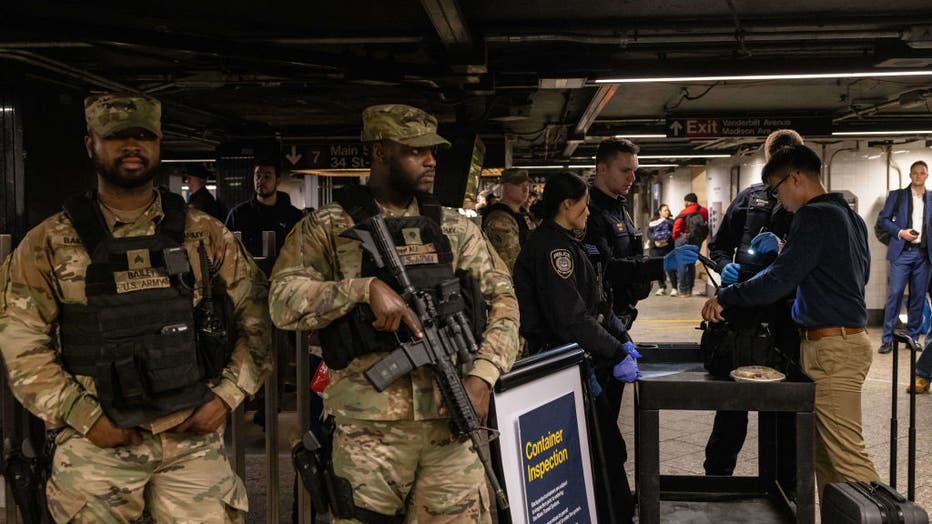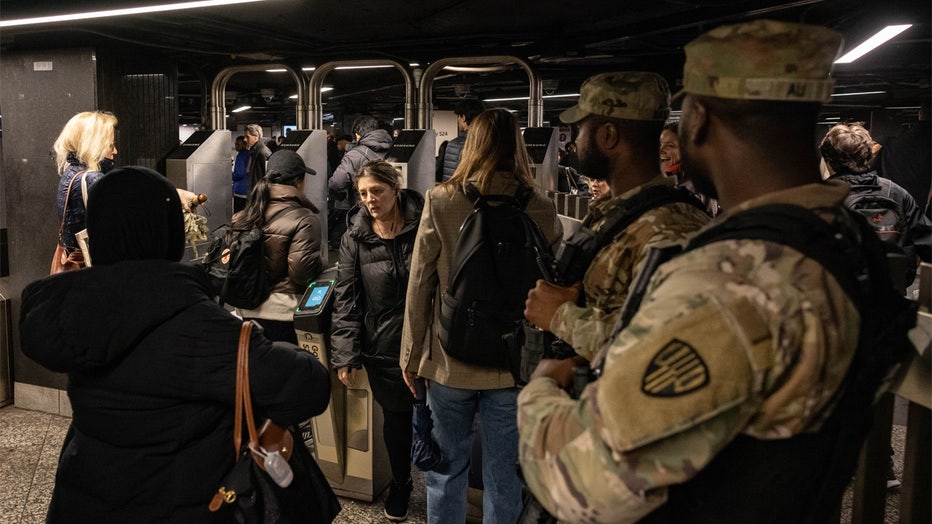National Guard in NYC subway: When, where and how it will work to deter crime

Exclusive: NY Gov. Kathy Hochul on GDNY
New York Gov. Kathy Hochul joined Good Day New York to discuss a variety of topics, including deploying the National Guard to NYC subway systems, the ongoing city migrant crisis, and the latest with congestion pricing.
NEW YORK CITY - New York Gov. Kathy Hochul is sending the National Guard to the NYC subway system.
The governor announced plans Wednesday to deploy around 750 National Guard members, as well as 250 state troopers and transit officers, to help the NYPD conduct random bag checks at some of the city's busiest subway stations.
"I'm the governor of the state of New York," Hochul said in an exclusive interview Thursday on Good Day New York. "My number one priority is the safety of all New Yorkers."
Featured
Hochul dispatches National Guard to NYC subways after a string of violent crimes
Governor Kathy Hochul has announced that she will deploy the National Guard to busy stations in the New York City subway system to address a surge in crime.
Hochul touched on a number of questions in the interview, including how the process will work and how they'll deal with individuals suffering from mental health.
Why bring in the National Guard?
"We have had a series of high profile crimes that have shaken the security of New Yorkers," Hochul said. "Statistically, it's not what it used to be, it's better, much better, but I'm not gonna talk about statistics."
Hochul says she wants more people on the subways, "and if people are feeling unsafe and won't come, then I have to do something about it."

National Guard patrolling NYC subway stations
New York Gov. Kathy Hochul is sending the National Guard to the NYC subway system.
Hochul also called NYC Mayor Eric Adams' deployment of 1,000 additional officers to the subways in February "a great move."
"Thirty-eight people committed assaults on transit workers," Adams said on Wednesday. "Out of those 38 people, they committed 1,126 crimes in our city."
The deployment is part of a larger plan from the governor’s office to address crime on the subway, including a legislative proposal to ban people from trains for three years if they are convicted of assaulting a subway passenger.
How will the bag searching process work?
"Randomly," Hochul said.
What happens if you don't want your bag searched?
"Then go home," Hochul said. "We're not going to search you, you can say no. But you're not taking the subway."

New York State Police officers conduct a container inspection, right, alongside members of the National Guard at the Grand Central-42 Street subway station in New York. (Yuki Iwamura/Bloomberg via Getty Images)
Is someone stationed at every entrance?
"We are looking at the main transit hubs with the most people coming through, we're going for volume to supplement the NYPD's efforts throughout the whole system," Hochul said.
The governor also mentioned having cameras on "every single subway."
"If people know they're being watched, that there's a camera that will record if they harm someone, assault, bring out a gun, have a knife, they're going to get caught," Hochul said. "I think that's going to have a powerful effect on the psychology of the criminals."
Bag searches were seen being enforced Thursday morning at the Grand Central subway stop.
According to the MTA, there are 472 stations across NYC.
What is the plan for individuals suffering from mental health issues?
"Two elements: One is we already have our safety plan of having individuals, trained professionals," Hochul said. "These are social workers. People who have a medical background. They are going in, have been now for a year and a half, to talk to people, develop a relationship with them, and get them to leave the subways, because if that's their primary home, we are now placing them into places they can have supportive services, a long-term home for them."

Members of the National Guard patrol the Grand Central-42 Street subway station in New York. (Yuki Iwamura/Bloomberg via Getty Images)
"Then there's a category of people that could do harm to themselves or others, very serious cases. I just allocated 20 million dollars more to add enhanced enforcement which have a police officer embedded in them because there could be danger for some of our social workers or professionals to engage with certain people."
How long will the National Guard stay?
It's unclear how long the National Guard will stay.
What are others saying?
Police in New York have long conducted random bag checks at subway entrances, though passengers are free to refuse and leave the station, raising questions of whether the searches are an effective policing tactic in a subway system that serves over 3 million riders per day.
Donna Lieberman, the executive director of the New York Civil Liberties Union called it "another unfortunate example of policy making through overreaction and overreach," in a statement.
"Sound policy making will not come from overreacting to incidents that, while horrible and tragic, should not be misrepresented as a crime wave and certainly don’t call for a reversion to failed broken windows policies of the past," she said, referring to the policing theory that going after smaller crimes can help stem greater disorder.
ANTHONY IZAGUIRRE, with the Associated Press, helped contribute to this report.



